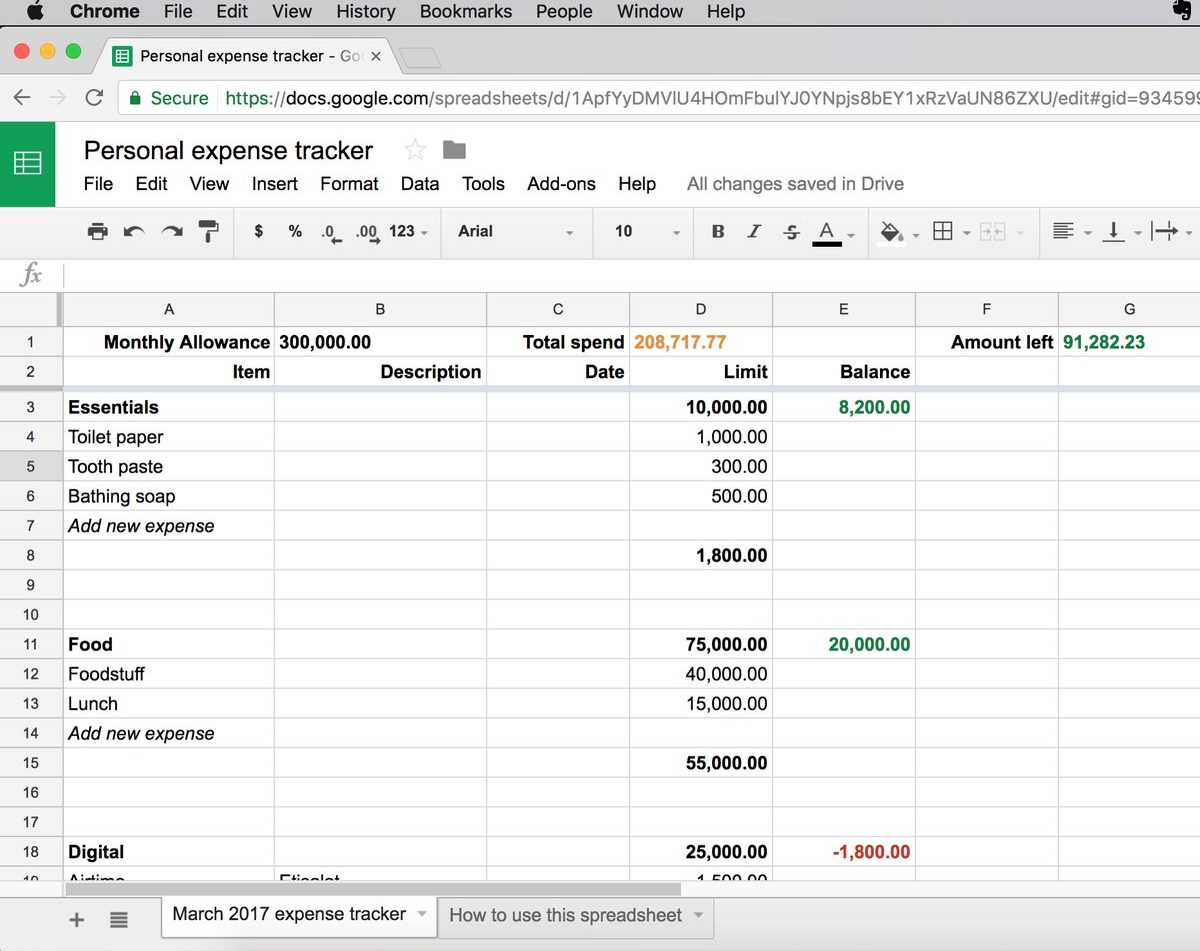![]() I finally created a personal expense tracking spreadsheet that I might actually use. The basic idea was a spreadsheet that I could stick my expenses in, you know, to see what was going on. And without really doing a lot, I can see the things that burn holes in my pocket the most frequently.
I finally created a personal expense tracking spreadsheet that I might actually use. The basic idea was a spreadsheet that I could stick my expenses in, you know, to see what was going on. And without really doing a lot, I can see the things that burn holes in my pocket the most frequently.
And the stars of the show this month are
1. Bank charges
2. Uber
3. Cafe Neo🤔
— Bankole Oluwafemi (@MrBankole) March 4, 2017
But then I got the idea to make the sheet give dynamic visual feedback about the numbers I was looking at. I added some conditional formatting to some cells with simple arithmetic functions. The actual work took like ten minutes, but the resulting sheet allows me set spending limits for broad expense categories and gives me visual feedback if I’m going over budget in any category. Changing the limit is as simple as overwriting one cell with the new number. So once your raise gets approved, you can responsibly reward yourself with a little more spending room without being afraid that your expenditure will rush to catch up to your income. Or you can contract your allowance to make room for that thing you really want to buy.
Almost done! Just making a few instruction notes… pic.twitter.com/zpobreltE3
— Bankole Oluwafemi (@MrBankole) March 7, 2017
Of course, the tracker is useless if you don’t actually track the expenses. Like every single kobo/shilling/cent/penny. That’s the part that I cannot quite automate yet even if I could code because the gatekeepers will not cooperate (more about that later). It all needs to go in there, as soon as possible, especially if you spend cash. For someone like me who’s hacked their life that it’s effectively 99.9 percent cashless, the transaction records might allow you put off entering the expenses for a while…but if you procrastinate for too long, it is certain to get messy. The spreadsheet template is free. But the discipline to use it is sold separately. Whether you use a spreadsheet or an abacus, tracking spending is not up there on the list of activities that people enjoy. The spreadsheet is functional, but I never said it would be fun. However, I get the sense that a lot of people are at least interested in the idea of getting some insight into their spending patterns, and I hope that this helps anyone who is motivated enough to actually use it. In fact, because I like to overthink things (and this guy asked), I’m making the template “open source”. That means that anyone can make changes to the original template, and request for their changes to be merged with the latest iteration of the template for everyone’s benefit. I will use Google sheets to create a versioning system…I’ll simply make each newly merged version of approved template edits a new sheet in the worksheet and label it accordingly. That way, anyone can find and use the version that works best for them…okay, I’m really getting ahead of myself. Maybe no one will like it. Or maybe no one will like it enough to suggest/make improvements. And that’s okay. It’s yet another personal expense tracking spreadsheet template, no biggie.
— Bankole Oluwafemi (@MrBankole) March 7, 2017
I obviously need to stop talking. But before I do, I want to make a quick shoutout to the ones who could actually create a solution that allows people track their spending intuitively…Nigerian banks, una well done. You know you could do this in a heartbeat. Or at least create secure APIs to enable third parties to do it. But I’m now retired, and I don’t do rants anymore. Bless up. Here’s the personal expense tracker template (read-only, so you have to copy or download it). Let me know what you think. If you want to suggest/make improvements, suggest them on this thread or send me a message on Twitter.















